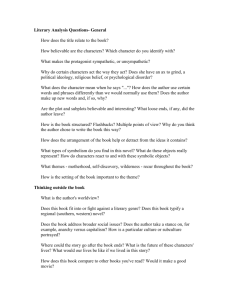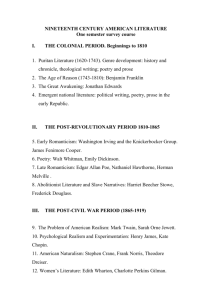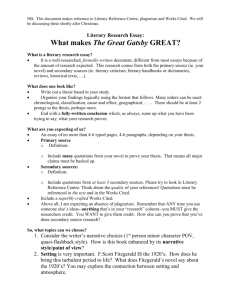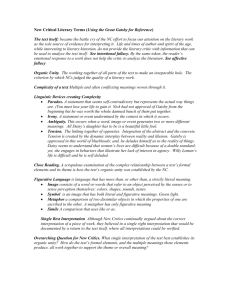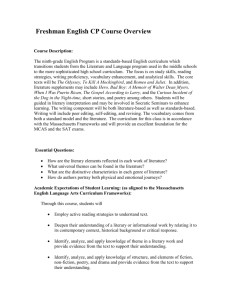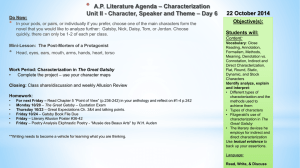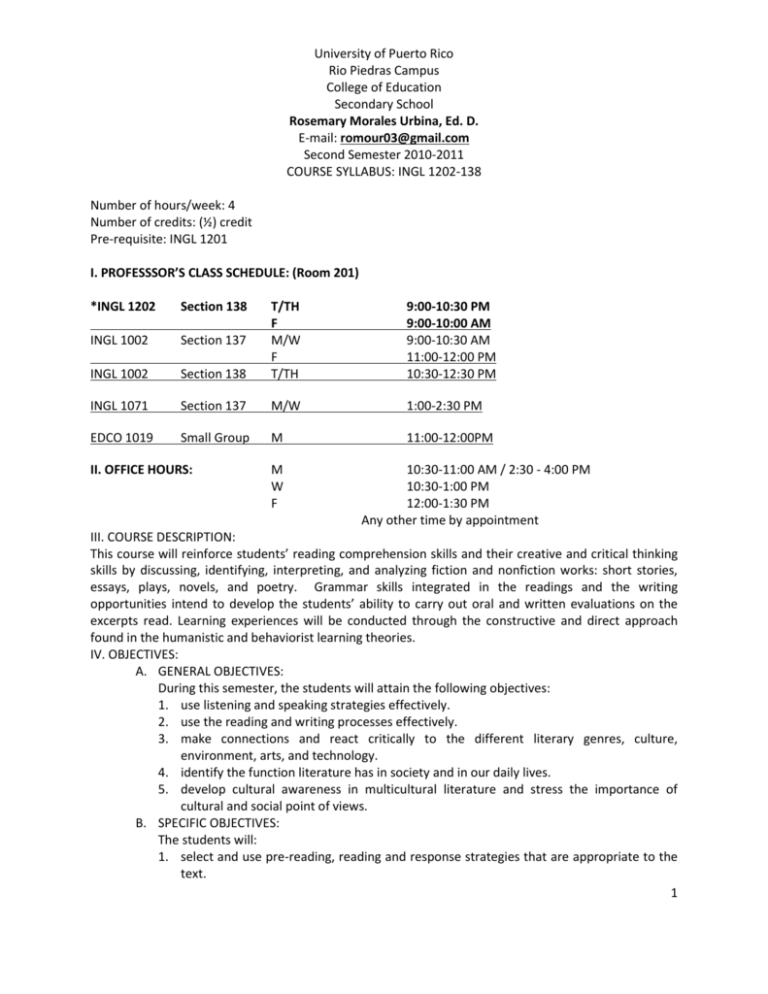
University of Puerto Rico
Rio Piedras Campus
College of Education
Secondary School
Rosemary Morales Urbina, Ed. D.
E-mail: romour03@gmail.com
Second Semester 2010-2011
COURSE SYLLABUS: INGL 1202-138
Number of hours/week: 4
Number of credits: (½) credit
Pre-requisite: INGL 1201
I. PROFESSSOR’S CLASS SCHEDULE: (Room 201)
*INGL 1202
Section 138
Section 138
T/TH
F
M/W
F
T/TH
9:00-10:30 PM
9:00-10:00 AM
9:00-10:30 AM
11:00-12:00 PM
10:30-12:30 PM
INGL 1002
Section 137
INGL 1002
INGL 1071
Section 137
M/W
1:00-2:30 PM
EDCO 1019
Small Group
M
11:00-12:00PM
II. OFFICE HOURS:
M
W
F
10:30-11:00 AM / 2:30 - 4:00 PM
10:30-1:00 PM
12:00-1:30 PM
Any other time by appointment
III. COURSE DESCRIPTION:
This course will reinforce students’ reading comprehension skills and their creative and critical thinking
skills by discussing, identifying, interpreting, and analyzing fiction and nonfiction works: short stories,
essays, plays, novels, and poetry. Grammar skills integrated in the readings and the writing
opportunities intend to develop the students’ ability to carry out oral and written evaluations on the
excerpts read. Learning experiences will be conducted through the constructive and direct approach
found in the humanistic and behaviorist learning theories.
IV. OBJECTIVES:
A. GENERAL OBJECTIVES:
During this semester, the students will attain the following objectives:
1. use listening and speaking strategies effectively.
2. use the reading and writing processes effectively.
3. make connections and react critically to the different literary genres, culture,
environment, arts, and technology.
4. identify the function literature has in society and in our daily lives.
5. develop cultural awareness in multicultural literature and stress the importance of
cultural and social point of views.
B. SPECIFIC OBJECTIVES:
The students will:
1. select and use pre-reading, reading and response strategies that are appropriate to the
text.
1
2. use a variety of information-gathering techniques and information resources.
3. identify the characteristics that distinguish literary forms: poetry, short stories, essays,
drama, and the novel.
4. study the different stylistic, thematic, and technical qualities present in the literature of
different cultures, their environment, and historical periods.
5. study the elements of literature of the different genres and utilize them to analyze the
piece of literature.
6. examine a literary selection using their personal response.
7. write for a diverse audience demonstrating mastery of the writing process.
8. use effective strategies for formal and informal discussions.
9. use effective verbal and non-verbal communication skills to meet the needs of the
listeners and the topic developed.
V. EVALUATION
A. QUIZZES
1. vocabulary
2. before any assigned reading
B. ASSIGNMENTS
C. TEST-AFTER EACH UNIT AND BEFORE AND AFTER THE DISCUSSION OF A NOVEL OR DRAMA.
D. DAILY GRADE-CLASS PARTICIPATION, ATTENDANCE, AND ATTITUDE
E. ORAL AND WRITTEN REPORTS
F. ESSAYS
G. WEEKLY SPELLING TESTS
H. WRITING (PORTFOLIO)
I. CREATIVE WORK
J. THIS COURSE PROVIDES FOR STUDENTS WHO HAVE SPECIAL EVALUATION NEEDS. THESE
STUDENTS SHOULD INFORM THE PROFESSOR.
VI. MATERIALS
TEXTBOOK
1. Prentice Hall Literature: Penguin Edition (2007). Boston, Massachusetts:
Pearson Prentice Hall. ISBN 0-13-131766-0
NOVELS
1. Fitzgerald, G. The Great Gatsby
VII. COURSE OUTLINE (STARTS WITH UNIT 3)
JANUARY 20-21
Review Syllabus Second Semester 2010-2011
Write an essay on either of the following topics: Christmas Vacation, UPR Conflict, How I Use
Technology
Begin reading The Great Gatsby by F. Scott Fitzgerald
JANUARY 24-28
Unit 3: Discuss Chinese and Japanese Literature (1000 B.C.–A.D. 1890) pp. 252-265
Discuss philosophy of Tao Te Ching and Confucius p. 264
Discuss “from Poor Richard’s Almanack” by Benjamin Franklin pp. 274-275
Read and discuss Focus on Literary Forms: Defining Poetry pp. 276-277
Discuss and analyze “The River Merchant’s Wife: A Letter” pp. 286-287
Apply the Skills p. 291, Reading Strategy, Responding #6
JANUARY 31-FEBRUARY 04
Read and analyze Tanka and Haiku Poetry pp. 296-303
2
Test on Unit 3
Unit 4: Discuss Ancient Greece and Rome (c. 800 B.C.–A.C. 500) pp. 348-362
Discuss and analyze “from The Iliad” by Homer (Book 1 and Book 6) pp. 360-379
Critical Reading p. 379, 1-5
FEBRUARY 07-11
Read and discuss “The Gettysburg Address” by Abraham Lincoln pp. 436-437
Test on Unit 4
Unit 5: Discuss From Decay to Rebirth: The Middle Ages (A.D. 450-1300) pp. 584-595
Discuss and analyze “The Lay of the Werewolf” by Marie de France pp. 642-648
Critical Reading p. 648, 1-6
Discuss and analyze “from The Inferno” by Dante Alighieri Canto I and Canto III pp. 659-671
Critical Reading p. 671, 1-6
FEBRUARY 14-18
Apply the Skills and Build Language Skills pp. 672-673
Discuss and analyze “from the Inferno” Canto V and Canto XXXIV pp.675-690
Critical Reading p. 690, 1-6
Apply the Skills and Build Language Skills pp. 691-692
Test on Unit 5
FEBRUARY 21-25
February 21 – Holiday: President’s Day
Comprehension Test on The Great Gatsby by Fitzgerald
Discuss and analyze the novel The Great Gatsby
February 25 – Faculty Meeting – NO CLASS
FEBRUARY 28 – MARCH 4
Discuss and analyze the novel The Great Gatsby
Analysis Test on the novel The Great Gatsby
Special novel project
MARCH 7-11 (TRAVEL BROCHURE DUE: [3/07] ENGLISH WEEK POSTER DUE: [3/11])
Unit 6: Discuss Rebirth and Exploration: The Renaissance and Rationalism (1300-1800) pp.714-725
Discuss Focus on Literary Forms: Sonnet pp. 726-727
Poems – pp. 728-734 and Apply the Skills p. 737 exercise 1, 2, 4, 5, and 8.
Build Language Skills – p. 738
MARCH 14-18 (POWERPOINT AND ORAL PRESENTATIONS DUE)
Build Skills: Fiction “from Don Quixote” pp. 768-769
Discuss and analyze “from Don Quixote” by Miguel de Cervantes Chapter 1, Part 1 and
Chapters 7 and 8 pp. 770-785
Critical Reading p. 777, 1-5 / p. 784, 1-5
Build Language Skills p. 786
MARCH 21-25 (ENGLISH WEEK: A LITERARY TASTE OF THE CARIBBEAN: LECTURES, EXHIBITS, RECITALS,
ARTISTIC PRESENTATIONS, and CONFERENCES)
March 22 – Holiday: Abolition of Slavery
Discuss “Great Minds Do Not Think Alike” p. 798-799
Discuss and analyze “from Candide” pp. 800-807
Apply the Skills p. 807, 1-5 and Build Language Skills p. 808
Vocabulary Workshop and Assessment Workshop pp. 826-827
March 25th REPORT CARDS - NO CLASS
3
MARCH 28 – APRIL 1
Test on Unit 6
Unit 7: Discuss Revolution and Reaction: Romanticism and Realism (1800-1890) pp. 832-843
Discuss and analyze “from Faust” by Johann Wolfgang pp. 844-863
Build Language Skills p. 864
Focus on Literary Forms: Lyric Poetry pp. 872-873
April 1 - Faculty Meeting – NO CLASS
APRIL 4-8
Discuss and analyze “I Have Visited Again” by Alexander Pushkin pp. 876-878
Apply the Skills p. 881, 1, 4, and 6 / Build Language Skills p. 882
Build Skills: Poems Romantic Poetry pp. 884-885 /
Discuss and analyze “The Sleeper in the Valley” by Arthur Rimbaud and “Autumn Song” by Paul
Verlaine pp. 889 and 894
Apply the Skills p. 895, 1 - Build Language Skills p. 896
Test on Unit 7
APRIL 11-15
Build Skills: Short Stories Dynamic and static characters pp. 904-905
Short stories: “Two Friends” by Guy de Maupassant p. 906-912 and “A Problem” by Anton
Chekhov pp. 928-936
Apply the Skills p. 937, 1, 3, 5, 6, 7
Build Language Skills p. 938, 999, 1024
April 15 – Field Day / April 16 – English Forensic League Competition
APRIL 18-22
April 18 – Holiday: José de Diego
April 21-22 – Holy Week Recess (Rest and Meditation)
APRIL 25-29
Unit 8: Discuss From Conflict to Renewal: The Modern World (1800-1945) pp. 1048-1063
Build Skills: Short Story Modernism pp.1064-1065
Build Language Skills p. 1110
Discuss and analyze “The Bracelet” by Colette p. 1116-1123
Critical Reading p. 1122, 1-5 / Apply the Skills p. 1123, 1, 2, 3, 6, 9
Build Language Skills p. 1124
April 29 – Faculty Meeting – NO CLASS
MAY 2-6
Build Skills: Poems Lyric Poetry and Epiphany pp. 1144-1145
Discuss and analyze “The Guitar” by Federico García Lorca p. 1146-47 and “Fear” by Gabriela
Mistral p. 1150
Apply the Skills p. 1155 1, 2, 3
Build Language Skills p. 1156
Read The Nobel Prize pp. 1158-1159
May 5 - Student’s Recognition Day / May 6 - Teacher’s Recognition Day – NO CLASS
MAY 9-13
Build Skills: Short Story Literary analysis: Conflict pp. 1160-61
Discuss and analyze “The Artist” by Rabindrananth Tagore pp. 1160-69
Critical Reading p. 1168, 1-6 / Apply the Skills p. 1169, 1-3, 5, 7
Build Language Skills pp. 1170 and 1336
MAY 16 Last day of class / MAY 17-19 - FINAL EXAMS (Test on Unit 8)
4
VII. X. CLASSROOM RULES
Respect must prevail at all times.
Active participation is a must.
All students are expected to have read and prepared for assignments before class meets.
English should be spoken at all times in the classroom.
Punctuality: No tardiness is allowed without a written excuse from home or the Main Office.
Absences: The student is responsible for bringing a written excuse signed by parent/guardian or
a doctor’s certificate. No reposition exams or quizzes will be given, unless the student has
brought one or the other. Students are responsible for class work, assignments, etc., when
absent.
Bring all essential materials to class every time we meet. Textbooks, novels, notebooks, pencils,
dictionaries, etc.
Projects or assignments submitted late will receive a penalty of one grade.
No eating, drinking or chewing gum in the classroom.
The following objects cannot be used or worn in the classroom: Cellular phones, sunglasses,
caps/hats.
*** ALL STUDENTS MUST FOLLOW THE SCHOOL DRESS CODE ***
************************************************************************
XI. AGREEMENT
After reading the course syllabus and classroom rules, parents/guardian and student will sign the
following agreement. The student will submit the signed portion to Professor Rosemary Morales Urbina,
for the 2010-2011 second semester academic year English course: INGL 1202 Sections 138.
I have carefully read and understand the English course outline and classroom rules. I agree to comply
with all the requirements.
Date__________________________________________ Student ID# 20______-____________
Student’s signature ______________________________________________________________
Student’s Name (Please Print) _____________________________________________________
Parent’s or Guardian’s signature____________________________________________________
Parent’s or Guardian’s name (Please Print) ___________________________________________
Teacher’s signature: _____________________________________________________________
Revised: January 2011
Rosemary Morales Urbina, Ed. D.
INGL 1202-138
5



